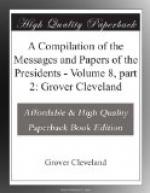GEORGE WASHINGTON.
UNITED STATES, April 16, 1792.
Gentlemen of the Senate and of the House of Representatives:
I lay before you a copy of a letter from the judges of the circuit court of the United States held for the New York district, and of their opinion and agreement respecting the “Act to provide for the settlement of the claims of widows and orphans barred by the limitations heretofore established, and to regulate the claims to invalid pensions.”
GEORGE WASHINGTON.
UNITED STATES, April 21, 1792.
Gentlemen of the Senate and of the House of Representatives:
I lay before you the copy of a letter which I have received from the judges of the circuit court of the United States held for the Pennsylvania district relatively to the “Act to provide for the settlement of the claims of widows and orphans barred by the limitations heretofore established, and to regulate the claims to invalid pensions.”
GEORGE WASHINGTON.
UNITED STATES, May 8, 1792.
Gentlemen of the Senate:
If the President of the United States should conclude a convention or treaty with the Government of Algiers for the ransom of the thirteen Americans in captivity there for a sum not exceeding $40,000, all expenses included, will the Senate approve the same? Or is there any, and what, greater or lesser sum which they would fix on as the limit beyond which they would not approve the ransom?
If the President of the United States should conclude a treaty with the Government of Algiers for the establishment of peace with them, at an expense not exceeding $25,000, paid at the signature, and a like sum to be paid annually afterwards during the continuance of the treaty, would the Senate approve the same? Or are there any greater or lesser sums which they would fix on as the limits beyond which they would not approve of such treaty?
GEORGE WASHINGTON.
VETO MESSAGE.
UNITED STATES, April 5, 1792.
Gentlemen of the House of Representatives:
I have maturely considered the act passed by the two Houses entitled “An act for an apportionment of Representatives among the several States according to the first enumeration,” and I return it to your House, wherein it originated, with the following objections:
First. The Constitution has prescribed that Representatives shall be apportioned among the several States according to their respective numbers, and there is no one proportion or divisor which, applied to the respective numbers of the States, will yield the number and allotment of Representatives proposed by the bill.
Second. The Constitution has also provided that the number of Representatives shall not exceed 1 for every 30,000, which restriction is by the context and by fair and obvious construction to be applied to the separate and respective numbers of the States; and the bill has allotted to eight of the States more than 1 for every 30,000.




